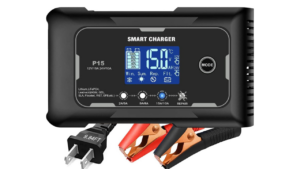Do thermometers have batteries? The answer is yes, some thermometers do require batteries to function properly. While you may have come across traditional mercury thermometers, modern digital thermometers have become increasingly popular due to their accuracy and convenience. These digital thermometers rely on batteries to power the LCD screen that displays the temperature readings. So, if you’re wondering whether your digital thermometer needs a battery replacement, you’ve come to the right place. In this article, we will delve into the world of thermometers, exploring how they work and why batteries play an essential role in their operation. Let’s get started!
Do Thermometers Have Batteries?
Thermometers are incredibly useful tools that help us measure temperature accurately and conveniently. Whether you’re using a thermometer for cooking, medical purposes, or various scientific applications, it’s important to understand how they work and whether they require batteries. In this article, we will explore the fascinating world of thermometers and answer the burning question: do thermometers have batteries?
Types of Thermometers
Before diving into whether thermometers require batteries, it’s essential to familiarize ourselves with the different types of thermometers available. Here are some common types of thermometers:
- Mercury Thermometers: These classic thermometers use mercury to measure temperature. Although they were widely used in the past, concerns about mercury toxicity have led to their phased-out usage in many applications.
- Digital Thermometers: Digital thermometers use electronic sensors to measure temperature accurately. They often display the temperature reading on an LCD screen, making them easy to read and operate.
- Infrared Thermometers: Infrared thermometers measure temperature without direct contact. They work by detecting the infrared energy emitted by an object and converting it into a temperature reading.
- Thermocouple Thermometers: Thermocouple thermometers utilize a junction between two different metals to measure temperature. The temperature difference generates a small voltage, which is then translated into a temperature reading.
- Thermistor Thermometers: Thermistor thermometers use a resistor with a temperature-dependent resistance to measure temperature. As the temperature changes, the resistance of the thermistor changes accordingly, allowing for accurate temperature readings.
Now that we have a better understanding of the various types of thermometers let’s explore whether or not they require batteries.
Thermometers That Require Batteries
While not all thermometers require batteries, some types do rely on battery power for their functionality. Here are a few examples of thermometers that need batteries:
Digital Thermometers
Digital thermometers are among the most commonly used thermometers in both medical and household applications. They offer accurate and quick temperature readings. Most digital thermometers utilize batteries to power the electronic components responsible for temperature detection, display, and other features.
Typically, digital thermometers use button cell batteries, such as LR41 or CR2032, which are small and long-lasting. These batteries are readily available and easily replaceable when they run out of power.
Infrared Thermometers
Infrared thermometers have gained popularity due to their non-contact temperature measurement capabilities. They are widely used in various fields, including medical, industrial, and automotive applications. Most infrared thermometers are powered by batteries, allowing for portable and convenient temperature measurements.
Similar to digital thermometers, infrared thermometers often use button cell batteries or other types of common batteries like AA or AAA.
Thermometers That Do Not Require Batteries
While some thermometers rely on batteries for their operation, there are other types that do not require batteries at all. Here are a couple of examples:
Mercury Thermometers
Mercury thermometers, despite being less common nowadays due to safety concerns, are entirely battery-free. These thermometers use the expansion and contraction of mercury inside a glass tube to measure temperature accurately. They are simple, reliable, and do not require any external power source.
However, it’s important to note that due to environmental and health concerns related to mercury, the use of mercury thermometers is strongly discouraged. It is essential to follow proper disposal methods for any mercury-containing thermometers.
Thermocouple Thermometers
Thermocouple thermometers are battery-free devices that generate a voltage based on the temperature difference between two metals. This voltage is then used to calculate the temperature accurately. Since they rely on the physics of temperature differentials rather than battery power, they do not require any batteries for operation.
The Advantages of Battery-powered Thermometers
While battery-free thermometers have their advantages, there are several reasons why thermometers that require batteries are widely used in various applications. Here are a few advantages of battery-powered thermometers:
- Portability: Battery-powered thermometers can be easily carried around, making them ideal for on-the-go temperature measurements.
- Digital Display: Battery-powered thermometers often feature digital displays, providing clear and precise temperature readings.
- Quick Results: Battery-powered thermometers typically offer rapid temperature readings, allowing for faster decision-making and response.
- Added Features: Many battery-powered thermometers come with additional features such as memory recall, fever alarms, and backlighting for enhanced usability.
In conclusion, the need for batteries in thermometers depends on the type of thermometer being used. Digital thermometers and infrared thermometers are commonly battery-powered, while mercury thermometers and thermocouple thermometers do not require batteries. Understanding the different types of thermometers and their power sources is crucial when choosing the right thermometer for your specific needs.
Whether you prefer the convenience of battery-powered thermometers or opt for the traditional battery-free alternatives, it’s essential to prioritize accuracy, reliability, and safety in temperature measurement. Always follow the manufacturer’s instructions regarding battery replacement and disposal to ensure proper usage and environmental responsibility.
Frequently Asked Questions
Do thermometers require batteries?
Yes, most thermometers require batteries to function properly. Batteries provide the necessary power for the internal circuitry of the thermometer, allowing it to measure and display accurate temperature readings.
What type of batteries do thermometers use?
The type of batteries used in thermometers can vary depending on the specific model. Common types include button cell batteries, such as CR2032, AA batteries, or AAA batteries. It’s important to check the manufacturer’s instructions or the labeling on the thermometer to determine the appropriate battery type to use.
How long do the batteries in thermometers last?
The battery life of thermometers can vary depending on factors such as usage frequency and the type of batteries used. On average, batteries in thermometers can last anywhere from several months to a couple of years. It’s recommended to keep spare batteries on hand to ensure uninterrupted use of the thermometer.
Can thermometers be used without batteries?
No, thermometers generally require batteries to function. The batteries power the internal components responsible for measuring and displaying temperature readings. Without batteries, the thermometer will not be able to operate and provide accurate temperature measurements.
Can rechargeable batteries be used in thermometers?
Yes, rechargeable batteries can be used in thermometers as long as they are compatible with the specific model. However, it’s important to note that rechargeable batteries typically have a lower voltage compared to disposable batteries. This may affect the accuracy and performance of the thermometer, so it’s advisable to use high-quality rechargeable batteries and monitor their charge levels regularly.
Final Thoughts
In conclusion, thermometers do not require batteries to function. The majority of thermometers available today are digital and are powered by built-in batteries. These batteries enable the thermometer to display accurate temperature readings without any additional power source. Therefore, users can simply use their thermometers directly out of the box. So, next time you need to measure your body temperature or the temperature of your surroundings, remember that there’s no need to worry about batteries – your thermometer is ready to go!



